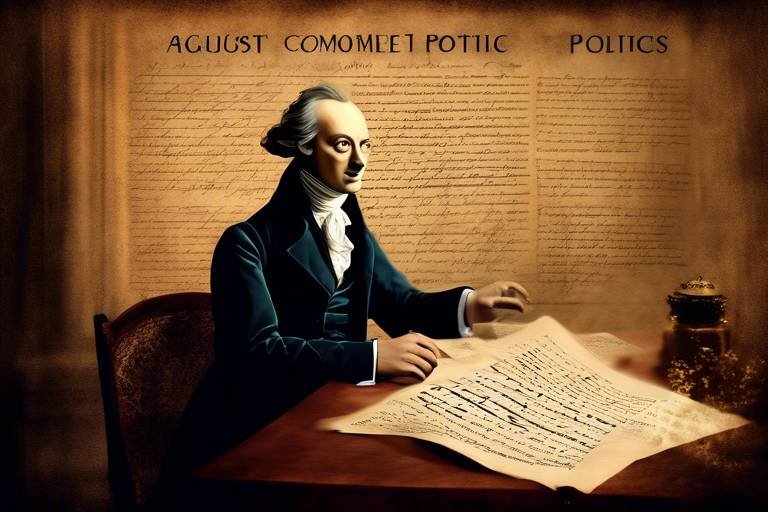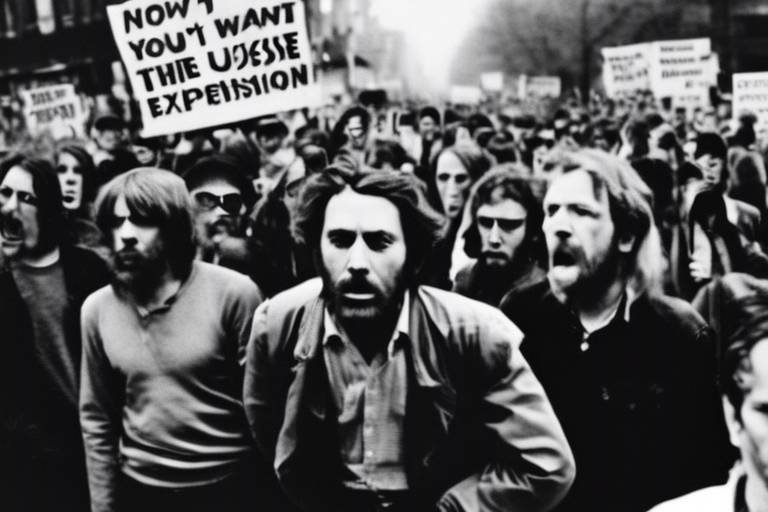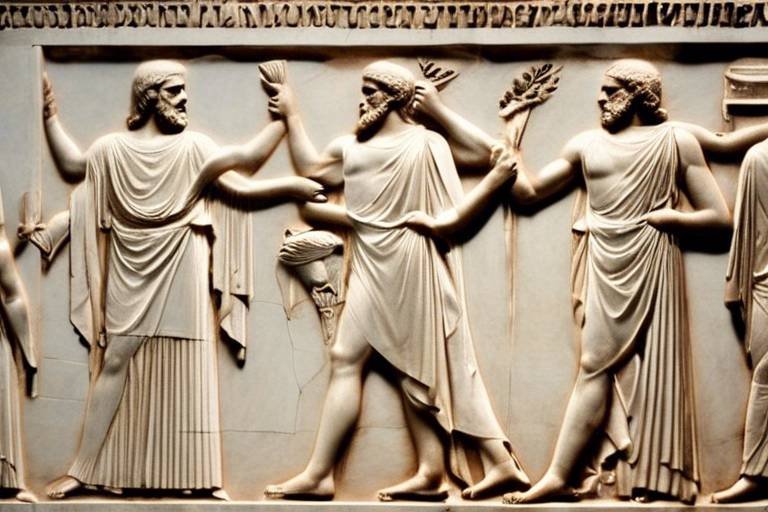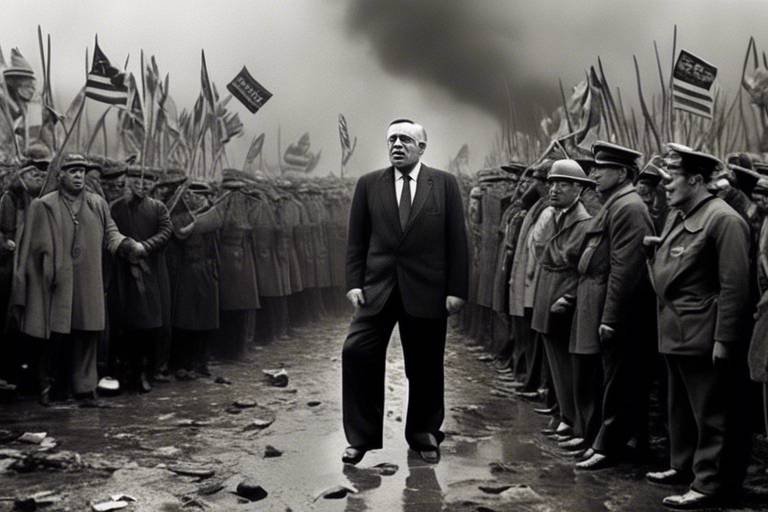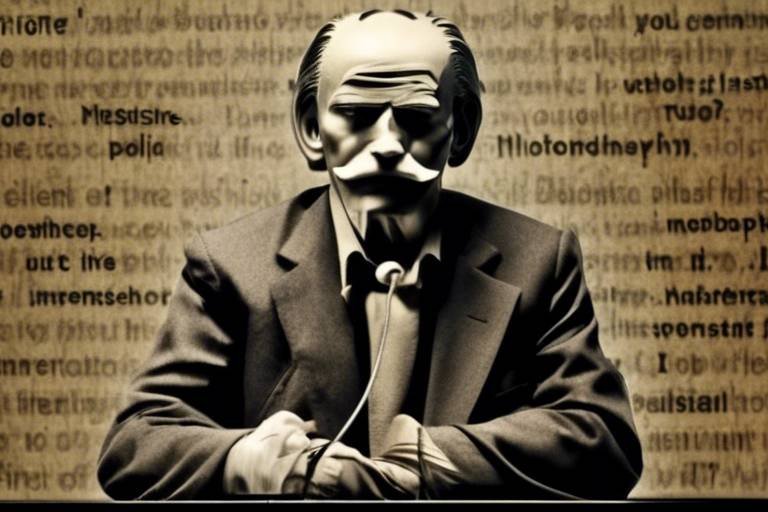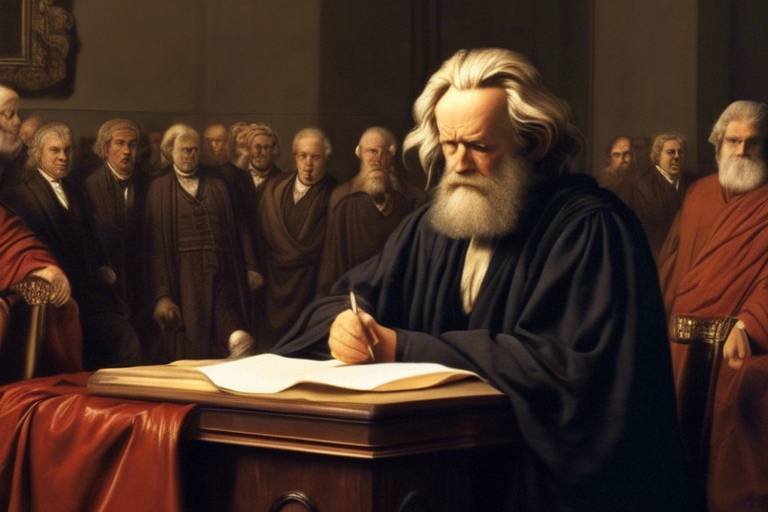Philosophy, Revolution, and the Politics of Change
The intricate dance between philosophy, revolutionary movements, and the politics of change has shaped the course of human history. From the streets of Paris during the French Revolution to the bustling squares of contemporary protests, the ideas that fuel revolutions are often rooted in philosophical thought. These ideas challenge the status quo, inspire the masses, and ultimately lead to profound transformations in society. But what exactly is this relationship, and how do ideas translate into action? This article seeks to unravel the threads that connect philosophical concepts with revolutionary fervor, illustrating how the power of thought can ignite the flames of change.
At its core, philosophy provides the framework for understanding human existence, governance, and morality. It raises essential questions: What is justice? What rights do individuals possess? How should power be distributed? These inquiries are not merely academic; they are the lifeblood of revolutionary movements. For instance, when individuals feel oppressed or marginalized, philosophical ideas can serve as a rallying cry, uniting people under a common cause. The politics of change often begins with a philosophical awakening, where individuals recognize their rights and the potential for a different future.
Throughout history, revolutions have been sparked by the clash between established norms and emerging philosophical ideas. The American Revolution and the French Revolution are prime examples where Enlightenment thinkers provided the intellectual ammunition for those seeking change. Thinkers like John Locke argued for the inalienable rights of individuals, while Jean-Jacques Rousseau emphasized the importance of the collective will. These ideas did not just remain on paper; they inspired ordinary citizens to take to the streets, demanding a voice in their governance and a say in their futures. This interplay between thought and action is what makes the study of philosophy and revolution so compelling.
So, what can we learn from the past? The history of revolutions teaches us that ideas matter. They can inspire people to rise against oppression, challenge unjust systems, and envision a better world. As we navigate the complexities of modern society, understanding the philosophical foundations of past movements can provide valuable insights into the politics of change today. The quest for justice, equality, and freedom continues, and philosophy remains a vital tool in the ongoing struggle for a better society.
In the following sections, we will delve deeper into the role of philosophy in revolutionary thought, explore historical revolutions and their philosophical underpinnings, and analyze the impact of key figures from the Enlightenment era. We will also examine how philosophical discourse has fueled social movements in the 20th century, highlighting the enduring relevance of these ideas in contemporary struggles for change.
- What is the relationship between philosophy and revolution? Philosophy provides the foundational ideas that inspire revolutionary movements, often challenging existing norms and advocating for change.
- How did Enlightenment thinkers influence revolutions? Enlightenment thinkers introduced concepts of individual rights and governance that motivated people to seek political change, particularly during the American and French Revolutions.
- Can philosophy still inspire change today? Absolutely! Philosophical discourse continues to play a crucial role in social justice movements and political activism, encouraging individuals to envision and strive for a better society.
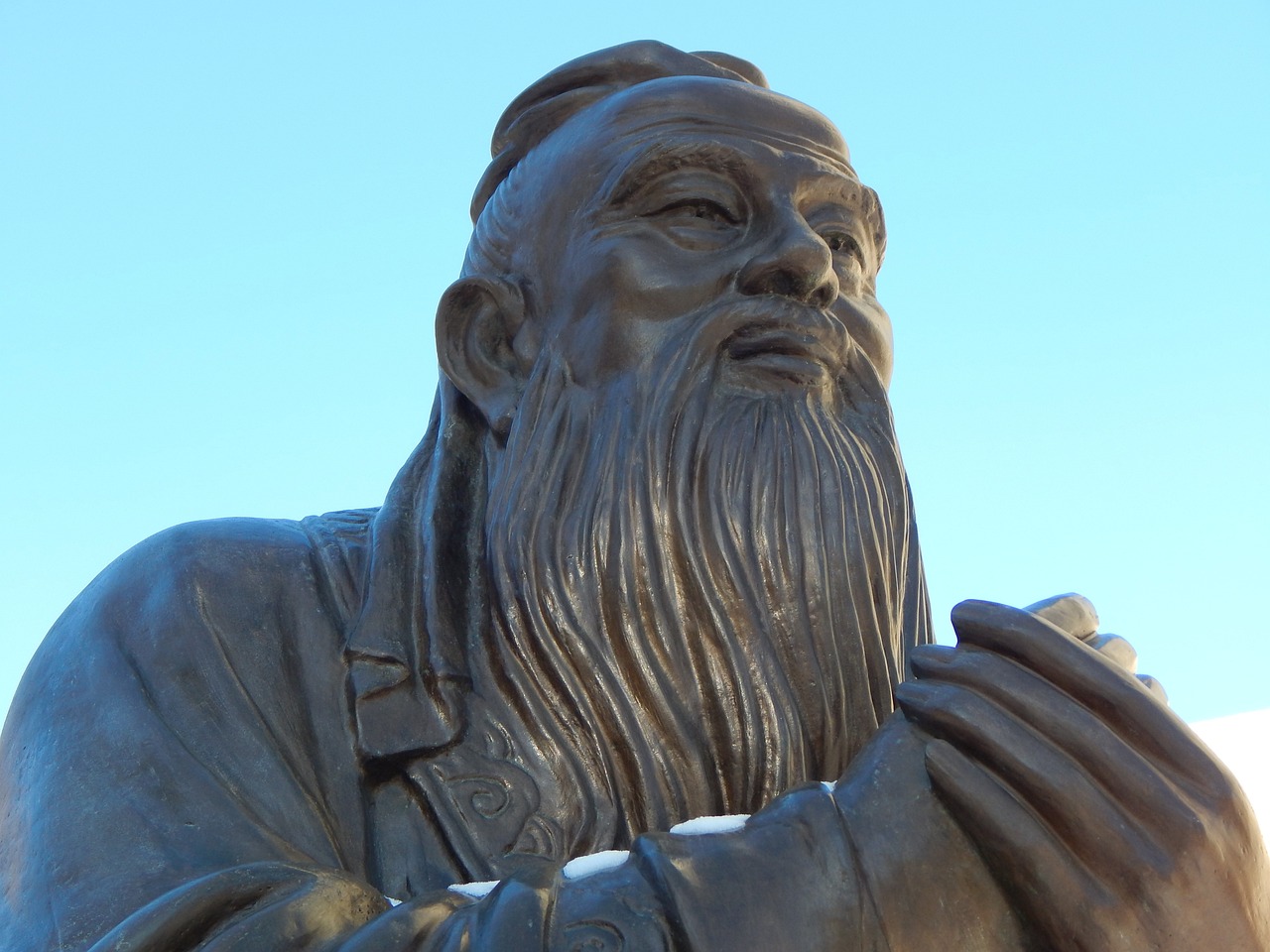
The Role of Philosophy in Revolutionary Thought
Philosophy has always been the catalyst of change, acting as a guiding light for revolutionary thought throughout history. At its core, philosophy seeks to question the status quo, challenging established norms and beliefs that govern society. This quest for understanding and improvement has often inspired individuals and groups to take action against oppression and injustice. Think about it: when you peel back the layers of any significant revolution, you often find a rich tapestry of philosophical ideas woven into its very fabric. These ideas not only justify the need for change but also provide a framework for envisioning what that change might look like.
Consider the impact of Enlightenment thinkers like John Locke and Jean-Jacques Rousseau. Their writings laid the groundwork for modern political philosophy, emphasizing concepts such as individual rights, liberty, and the social contract. These ideas didn't just float in the ether; they sparked movements that demanded political reform. For instance, Locke's assertion that government derives its power from the consent of the governed became a rallying cry for revolutionaries seeking to overthrow tyrannical regimes. In this way, philosophy serves not only as a theoretical pursuit but also as a practical tool for social change.
Moreover, the role of philosophy in revolutionary thought can be broken down into several key functions:
- Framework for Justification: Philosophical ideas often provide the moral and ethical justifications for revolution. They articulate why change is necessary and what principles should guide this change.
- Vision for the Future: Philosophers help envision a better society, outlining the goals and ideals that revolutions strive to achieve. This vision can unite diverse groups under a common cause.
- Critique of Existing Systems: Philosophy encourages critical thinking about current political and social systems, questioning their validity and effectiveness.
In essence, philosophy is the fuel that ignites the fire of revolution. It empowers individuals to think critically, to question authority, and to envision a world that reflects their ideals. Without philosophical inquiry, revolutions could easily devolve into chaos, lacking direction and purpose. Therefore, understanding the philosophical underpinnings of revolutionary movements is crucial for grasping their significance and impact on society.
As we explore historical revolutions, it becomes evident that the interplay between philosophy and action is not just a footnote in history; it is the very essence of what drives societal transformation. The ideas birthed in the minds of philosophers have the power to inspire millions, turning abstract thoughts into tangible movements that shape the course of history. This dynamic relationship between philosophy and revolution continues to resonate today, reminding us that ideas can indeed change the world.

Historical Revolutions and Their Philosophical Foundations
The tapestry of history is richly woven with the threads of revolution, where philosophy often serves as the loom that shapes the fabric of societal change. From the fervor of the French Revolution to the ideals that sparked the American Revolution, philosophical thought has played a pivotal role in motivating people to rise against oppression and demand change. These revolutions were not merely spontaneous uprisings; they were deeply rooted in the ideas and beliefs of their time, which provided the intellectual fuel for action. The interplay between philosophy and revolutionary movements offers a fascinating glimpse into how ideas can inspire entire nations to challenge the status quo.
For instance, the French Revolution, which erupted in 1789, was significantly influenced by Enlightenment thinkers who championed the rights of individuals and questioned the divine right of kings. Philosophers like Jean-Jacques Rousseau and Voltaire emphasized the importance of liberty, equality, and fraternity—principles that became rallying cries for revolutionaries. The Declaration of the Rights of Man and of the Citizen, a fundamental document of the French Revolution, echoed these Enlightenment ideals, asserting that all men are born free and equal in rights. This profound shift in thought was not just a call for political change; it was a fundamental rethinking of human rights and governance.
Similarly, the American Revolution, which unfolded a few decades earlier, was steeped in the philosophical writings of John Locke. Locke’s theories on natural rights and government by consent provided a robust framework for the colonists' grievances against British rule. His assertion that individuals have the right to life, liberty, and property became the cornerstone of the American ethos. The Declaration of Independence, penned by Thomas Jefferson, was heavily influenced by Locke’s philosophy, declaring the colonies' right to revolt against tyranny. This philosophical foundation not only justified the revolution but also laid the groundwork for the establishment of a new nation based on democratic principles.
To better understand the philosophical foundations of these revolutions, let’s examine some key concepts that emerged during this period:
| Revolution | Philosophical Influence | Key Ideas |
|---|---|---|
| French Revolution | Enlightenment Thinkers | Liberty, Equality, Fraternity |
| American Revolution | John Locke | Natural Rights, Consent of the Governed |
These ideas did not exist in a vacuum; they were products of their time, reflecting the struggles and aspirations of people who yearned for change. The philosophical discourse that preceded these revolutions provided a powerful narrative that not only justified the actions of the revolutionaries but also galvanized support among the populace. It is essential to recognize that the success of these revolutions was not solely due to military might or popular support, but also because they were underpinned by compelling philosophical arguments that resonated deeply with the collective consciousness of society.
Moreover, the impact of these revolutions extended far beyond their borders. The philosophical underpinnings of the French and American Revolutions influenced other movements across the globe, from the Haitian Revolution, which sought to abolish slavery, to the Latin American wars of independence. Each of these movements drew inspiration from the core ideals of freedom and justice, demonstrating the universal appeal of revolutionary philosophy.
In conclusion, the relationship between historical revolutions and their philosophical foundations is a testament to the power of ideas. Philosophy does not merely exist as abstract thought; it is a dynamic force that can inspire action, challenge oppression, and reshape societies. As we reflect on these historical events, we must acknowledge the profound impact that philosophical discourse has had on the course of human history, reminding us that ideas can indeed change the world.

Enlightenment Ideas and Political Change
The Enlightenment era, often referred to as the Age of Reason, was a time when **intellectual fervor** ignited a wave of revolutionary thought across Europe and beyond. Thinkers began to challenge the **status quo**, advocating for principles that would lay the groundwork for modern democracy. At the heart of this movement was the belief that **human reason** could be used to understand and improve the world, leading to significant political change. But what exactly were these ideas, and how did they inspire revolutions?
One of the most significant contributions of Enlightenment thinkers was the notion of **natural rights**. Philosophers like John Locke posited that individuals are born with inherent rights to **life, liberty, and property**. This radical idea suggested that governments should exist to protect these rights rather than infringe upon them. Imagine living in a world where your fundamental freedoms are guaranteed by law—this was the vision that fueled the revolutionary spirit of the time.
Moreover, the Enlightenment emphasized the importance of **social contracts**. Rousseau famously argued that a legitimate government must be based on the consent of the governed. This concept not only challenged the divine right of kings but also inspired ordinary citizens to demand a say in their governance. It was a call to action, urging people to unite and advocate for their rights, which ultimately led to significant political upheaval.
As these ideas spread, they collided with existing political structures, creating a fertile ground for revolution. The **American Revolution** is a prime example of how Enlightenment principles were put into practice. Influenced by thinkers like Locke, revolutionaries sought to overthrow British rule, establishing a new government grounded in the belief of popular sovereignty. The Declaration of Independence, a document steeped in Enlightenment philosophy, proclaimed that governments derive their power from the consent of the governed, capturing the essence of this transformative era.
Similarly, the **French Revolution** was deeply rooted in Enlightenment thought. The cries for liberty, equality, and fraternity resonated with the philosophical ideals that had taken hold of the populace. The revolutionaries were inspired by the belief that they could reshape society based on reason and justice. The **Declaration of the Rights of Man and of the Citizen** articulated these Enlightenment ideals, asserting that all men are born free and equal in rights, a statement that challenged centuries of aristocratic privilege.
In conclusion, the Enlightenment was not just an intellectual movement; it was a catalyst for profound political change. The ideas that emerged during this period inspired countless individuals to rise against oppression and demand a better world. They ignited revolutions that reshaped nations and laid the foundation for contemporary democratic ideals. As we reflect on this era, it's essential to recognize how these philosophical principles continue to influence our understanding of governance and individual rights today.
- What was the Enlightenment? The Enlightenment was an intellectual movement in the 17th and 18th centuries that emphasized reason, individualism, and skepticism of traditional authority.
- How did Enlightenment ideas influence revolutions? Enlightenment ideas about natural rights, social contracts, and the role of government inspired people to challenge oppressive regimes and advocate for democratic principles.
- Who were key figures of the Enlightenment? Notable Enlightenment thinkers include John Locke, Jean-Jacques Rousseau, and Voltaire, each contributing to the development of revolutionary thought.
- What are natural rights? Natural rights are fundamental rights that individuals possess inherently, such as the rights to life, liberty, and property, which governments are meant to protect.

Key Figures of the Enlightenment
The Enlightenment was a remarkable period that ushered in a wave of intellectual awakening, and at the heart of this transformation were several key figures whose ideas ignited revolutionary thoughts and actions. Jean-Jacques Rousseau, John Locke, and Voltaire stand out as pivotal thinkers whose philosophies not only challenged the status quo but also laid the groundwork for modern democratic ideals. Their contributions were not merely academic; they resonated with the masses and inspired movements that sought to reshape society.
Let's start with John Locke, often referred to as the father of liberalism. Locke's philosophy centered around the concept of natural rights—life, liberty, and property. He argued that governments are formed to protect these rights and that any government failing to do so could justifiably be overthrown. This idea was revolutionary, as it shifted the perspective of governance from divine right to a social contract, where the authority of rulers is derived from the consent of the governed.
Next, we have Jean-Jacques Rousseau, whose work emphasized the importance of the general will and the idea that individuals should be free and equal in society. Rousseau's famous quote, "Man is born free, and everywhere he is in chains," encapsulates his belief that societal structures often hinder individual freedom. His thoughts on democracy and collective governance inspired many revolutionaries, especially during the French Revolution, where the call for equality and fraternity echoed his ideals.
Lastly, Voltaire was a fierce advocate for civil liberties, particularly freedom of speech and religion. His sharp wit and criticism of the church and state underscored the importance of reason and tolerance in society. Voltaire famously stated, "I disapprove of what you say, but I will defend to the death your right to say it," highlighting his commitment to free expression. His writings were instrumental in advocating for reforms and questioning oppressive institutions, making him a significant figure in the Enlightenment.
These thinkers not only shaped the political landscape of their time but also left an indelible mark on future generations. Their ideas fostered a climate of questioning and debate that led to revolutionary actions across Europe and beyond. The principles they championed—liberty, equality, and fraternity—continue to resonate in modern democracies, illustrating the profound impact of Enlightenment philosophy on contemporary governance.
To summarize, the Enlightenment was characterized by a rich tapestry of ideas from influential figures like Locke, Rousseau, and Voltaire. Their philosophies provided the intellectual fuel for revolutions, challenging traditional power structures and advocating for a society grounded in reason and justice.

Impact on Modern Democracies
The impact of Enlightenment philosophy on modern democracies is nothing short of revolutionary. The principles laid out by Enlightenment thinkers have not only shaped political thought but also provided the very foundation for democratic governance that we see today. When we consider the core ideas of individual rights, the social contract, and the separation of powers, we can trace a direct line from the Enlightenment to the political systems that govern many nations around the world.
One of the most significant contributions of Enlightenment philosophers was the idea that governments derive their legitimacy from the consent of the governed. This notion fundamentally altered the relationship between the state and its citizens. Instead of viewing rulers as divinely appointed, people began to see themselves as active participants in their governance. This shift paved the way for democratic revolutions, where the populace demanded a voice in their own affairs. For instance, the American Revolution was heavily influenced by the writings of John Locke, who argued for the protection of life, liberty, and property as natural rights.
Moreover, the Enlightenment introduced the concept of the social contract, which posits that individuals agree to form societies and governments to secure their mutual benefit. This idea has been integral in shaping modern democratic principles, where the government is seen as a servant to the people rather than a master. In essence, this framework encourages a system where citizens hold the power to elect their leaders and influence legislation, ensuring that their rights and freedoms are protected.
Furthermore, the Enlightenment's advocacy for freedom of expression and the press has had lasting effects on modern democracies. These freedoms are essential for a healthy democracy, allowing for open dialogue, debate, and the exchange of ideas. Without these rights, the very essence of democratic governance would be undermined. The ability to criticize the government and propose alternative viewpoints fosters a culture of accountability, which is crucial for the longevity of any democratic system.
To illustrate the profound influence of Enlightenment ideas on modern democracies, consider the following table that highlights key Enlightenment thinkers and their contributions:
| Philosopher | Key Contributions | Impact on Modern Democracies |
|---|---|---|
| John Locke | Natural rights, social contract | Foundation for individual rights and government accountability |
| Jean-Jacques Rousseau | General will, popular sovereignty | Emphasis on the role of the people's voice in governance |
| Voltaire | Freedom of speech, separation of church and state | Promotion of civil liberties and secular governance |
In conclusion, the impact of Enlightenment philosophy on modern democracies is evident in the foundational principles that guide contemporary governance. From the emphasis on individual rights to the importance of civic engagement, the legacy of Enlightenment thinkers continues to resonate through the political systems of today. As we navigate the complexities of modern society, it is crucial to remember that the ideals of the Enlightenment serve as a guiding light, reminding us of the power of ideas to inspire change and shape our world.
- How did Enlightenment thinkers influence modern democracy? Enlightenment thinkers emphasized individual rights, the social contract, and the importance of consent, which laid the groundwork for democratic governance.
- What role did the concept of the social contract play in revolutions? The social contract shifted the view of government from a divine right to a system accountable to the people, inspiring revolutions like the American and French revolutions.
- Why is freedom of expression important in a democracy? Freedom of expression allows for open dialogue and criticism of the government, fostering accountability and ensuring that diverse viewpoints are heard.

Philosophy as a Tool for Social Change
Philosophy has long been recognized as a powerful instrument for driving social change. It acts as a lens through which we can examine the injustices and inequalities that permeate our societies. By providing a framework for understanding the human condition, philosophy invites us to question the status quo and inspires us to envision a better world. Think about it: when was the last time you encountered a philosophical idea that made you rethink your beliefs or actions? This is precisely where the transformative power of philosophy lies.
Throughout history, various philosophical movements have sparked social revolutions. One of the most notable examples is the work of John Stuart Mill, who championed individual liberty and the importance of personal freedoms. His ideas on utilitarianism and the harm principle served as a foundation for advocating social reforms, influencing everything from women's rights to labor laws. Mill's philosophy encourages us to consider the greater good and the impact of our actions on others, which is essential for any meaningful social change.
Moreover, the intersection of philosophy and activism is vividly illustrated in the writings of Martin Luther King Jr.. King drew upon the principles of nonviolence and civil disobedience, deeply rooted in the teachings of philosophers like Henry David Thoreau and Gandhi. His famous letter from Birmingham Jail is a testament to how philosophical discourse can galvanize a movement. In it, he articulates the moral imperative for justice and equality, reminding us that “injustice anywhere is a threat to justice everywhere.” This powerful assertion highlights how philosophy can serve as a rallying cry for those advocating for social change.
Philosophy also provides the tools necessary for critical thinking and ethical reasoning, which are crucial in addressing complex social issues. By engaging with philosophical texts and ideas, individuals can develop a more nuanced understanding of societal problems. For instance, the concept of social contract theory challenges us to consider the obligations we have to one another as members of a community. This idea can motivate individuals to engage in civic duties and advocate for policies that promote social welfare.
In contemporary society, we see the influence of philosophy in various social movements, from environmental activism to racial justice campaigns. Philosophers like Judith Butler have explored gender identity and the politics of recognition, pushing for a more inclusive understanding of human rights. Similarly, environmental philosophers challenge us to reconsider our relationship with nature, advocating for sustainable practices and policies that protect our planet for future generations.
In conclusion, philosophy is not merely an abstract pursuit; it is a vital tool for social change. By challenging our assumptions, inspiring action, and fostering critical discourse, philosophy empowers individuals and movements to strive for a more equitable and just society. It encourages us to ask the tough questions and seek answers that resonate with our shared humanity. So, the next time you ponder a philosophical idea, remember its potential to ignite change and inspire action.
- How does philosophy influence social movements?
Philosophy provides the ethical frameworks and critical perspectives that inspire individuals to challenge injustices and advocate for change. - Can philosophy lead to tangible social change?
Absolutely! Philosophical ideas have historically motivated movements for civil rights, gender equality, and environmental justice, among others. - What role do philosophers play in social change?
Philosophers can act as thought leaders, providing the intellectual foundation for movements and inspiring activists to pursue their goals.

Revolutionary Movements in the 20th Century
The 20th century was a period marked by intense social upheaval and transformative revolutionary movements that reshaped nations and ideologies. From the rise of communism to the civil rights movements, the century was a canvas painted with the broad strokes of philosophical thought and the fervent cries for change. What drove these movements? Was it merely the desire for power, or was there a deeper philosophical underpinning that galvanized the masses?
One of the most significant revolutions of this era was the Russian Revolution of 1917, which was heavily influenced by Marxist philosophy. Marxism, with its critique of capitalism and advocacy for a classless society, provided a framework that inspired the Bolsheviks to rise against the Tsarist regime. The ideas of Karl Marx and Friedrich Engels were not just theoretical musings; they became a rallying cry for the oppressed. This revolution set the stage for a new political landscape, showcasing how philosophy can ignite a fire of change.
Meanwhile, in the United States, the civil rights movement of the 1960s was another powerful example of how philosophical discourse can catalyze social change. Leaders like Martin Luther King Jr. drew on the principles of nonviolence and human rights, echoing the teachings of Mahatma Gandhi. The movement sought not only to dismantle segregation but also to challenge the very fabric of societal norms. Through peaceful protests and powerful rhetoric, the movement highlighted the importance of individual agency and moral responsibility in the quest for justice.
As we delve deeper into the 20th century, we encounter the existentialist movements that arose in post-war Europe. Thinkers like Jean-Paul Sartre and Simone de Beauvoir emphasized the importance of individual agency and the responsibility that comes with it. Their ideas resonated with those disillusioned by the devastation of two world wars. Existentialism encouraged individuals to take control of their destinies, sparking movements that sought to redefine personal and collective freedom. This philosophical shift was not just an academic exercise; it inspired many to question authority and embrace a more liberated existence.
In examining these revolutionary movements, it's clear that the interplay between philosophy and action is profound. The 20th century was not just about political upheaval; it was a time when ideas took center stage, influencing millions and paving the way for modern political thought. These movements remind us that philosophical ideas are not merely abstract concepts; they are powerful tools that can inspire change and mobilize communities.
- What role did philosophy play in the 20th-century revolutions?
Philosophy provided the ideological framework that inspired and justified revolutionary actions, helping to mobilize people around common goals. - How did Marxism influence revolutionary movements?
Marxism offered a critique of capitalism and a vision for a classless society, motivating many to seek radical change in their political systems. - What is existentialism, and how did it impact social movements?
Existentialism emphasizes individual freedom and responsibility, encouraging people to take action against oppressive systems and seek personal and collective liberation.

Marxism and the Politics of Revolution
Marxism, a revolutionary philosophy founded by Karl Marx and Friedrich Engels, has profoundly influenced political movements across the globe. At its core, Marxism critiques the capitalist system, asserting that economic structures shape societal relations and power dynamics. This ideology argues that history is driven by class struggles, where the oppressed (the proletariat) rise against their oppressors (the bourgeoisie). The essence of Marxism lies in its call for a radical transformation of society to achieve equality and justice for all.
One of the most compelling aspects of Marxism is its analysis of capitalism as a system that inherently creates inequality. Marx posited that the capitalist mode of production exploits workers, who sell their labor for wages that do not reflect the true value of their work. This exploitation leads to alienation, where individuals feel disconnected from the products of their labor, their fellow workers, and even their own humanity. Such a perspective not only critiques the economic system but also lays the groundwork for revolutionary action. But how does this translate into political movements? Let's explore the key principles of Marxism that have inspired revolutions:
- Historical Materialism: This principle suggests that material conditions and economic factors are the primary influences on societal development. Understanding this allows revolutionaries to identify the root causes of oppression.
- Class Struggle: Marx argued that all historical developments are driven by conflicts between different social classes, emphasizing the need for the working class to unite and overthrow capitalist structures.
- Dictatorship of the Proletariat: This concept advocates for a transitional state in which the working class holds political power, ensuring that the means of production are collectively owned and managed.
Throughout the 20th century, Marxism inspired numerous revolutions, from the Russian Revolution of 1917 to various movements in Latin America, Asia, and Africa. These revolutions were often fueled by the promise of a new society where wealth and resources would be shared more equitably. The Russian Revolution, in particular, showcased how Marxist ideology could be mobilized to dismantle an existing regime and establish a new political order. The Bolsheviks, led by figures like Lenin, interpreted Marx's ideas to fit their context, demonstrating the adaptability of Marxism to different revolutionary situations.
However, it is essential to recognize that the implementation of Marxism has varied widely, leading to both successes and failures. In some cases, revolutionary movements have achieved significant social reforms, while in others, they have resulted in authoritarian regimes that contradicted the very principles of liberation and equality that Marx envisioned. This dichotomy raises critical questions about the nature of revolutionary politics and the ethics of using Marxist theory as a blueprint for societal change.
In contemporary discussions, Marxism continues to resonate, particularly in the context of global capitalism, economic disparity, and social justice movements. Activists and theorists alike draw upon Marxist critiques to challenge the status quo and advocate for systemic change. The ongoing relevance of Marxism in today's political landscape underscores its foundational assertion: that the struggle for justice and equality is an enduring battle, one that requires both philosophical insight and courageous action.
- What is the main idea of Marxism?
Marxism primarily critiques capitalism and advocates for a classless society through the collective ownership of the means of production. - How did Marxism influence revolutions?
Marxism provided a theoretical framework for understanding class struggle, motivating oppressed groups to rise against their oppressors and seek social change. - What are the key principles of Marxism?
The key principles include historical materialism, class struggle, and the dictatorship of the proletariat. - Are all Marxist movements successful?
No, while some Marxist movements have achieved significant reforms, others have led to authoritarian regimes that contradict Marxist ideals.

Existentialism and Individual Agency
Existentialism is a philosophical movement that places a strong emphasis on the individual's experience, choice, and agency in shaping their own existence. Unlike traditional philosophies that might focus on universal truths or predetermined paths, existentialism argues that each person is responsible for creating their own meaning in a world that can often seem chaotic and indifferent. This idea of individual agency is particularly powerful in the context of revolutionary movements, as it empowers individuals to take action based on their own beliefs and desires.
At its core, existentialism invites us to confront the inherent absurdity of life. Think of it as standing at the edge of a vast ocean with no map or compass. The waves crash around you, unpredictable and wild, yet it is up to you to decide how to navigate those waters. This metaphor encapsulates the existentialist belief that while the universe may not provide clear answers, we possess the freedom—and indeed, the obligation—to define our own paths.
One of the most influential existentialist thinkers, Jean-Paul Sartre, famously declared that “existence precedes essence.” This means that we are not born with a predefined purpose; instead, we create our essence through our actions and choices. This notion can be revolutionary in itself, as it challenges individuals to reject societal norms and expectations that may stifle their true selves. In revolutionary contexts, this philosophy has inspired many to rise against oppressive systems, asserting their right to define their own lives and destinies.
Moreover, existentialism encourages individuals to embrace their freedom, even when it comes with the burden of responsibility. This duality is central to the existentialist experience: we are free to make choices, but we must also bear the consequences of those choices. In a revolutionary framework, this can be seen as a call to action; individuals must recognize their power to effect change and take responsibility for the outcomes of their actions. This sense of empowerment can ignite movements, as people come together to fight for their beliefs and assert their agency in the face of oppression.
Existentialism also intersects with the concept of authenticity. To be authentic is to live in accordance with one’s true self, rather than conforming to external pressures. In revolutionary movements, authenticity can serve as a rallying cry, encouraging individuals to stand up for their beliefs and values. The idea that one must be true to oneself can inspire collective action, as people unite around shared ideals and the desire for genuine change.
In summary, existentialism not only highlights the importance of individual agency but also serves as a powerful philosophical foundation for revolutionary thought. By embracing the freedom to choose and the responsibility that comes with it, individuals can ignite movements that challenge the status quo. The existentialist perspective encourages us to take ownership of our lives, fostering a sense of empowerment that can lead to profound societal change.
- What is existentialism? Existentialism is a philosophical movement that emphasizes individual experience, choice, and responsibility in creating meaning in an indifferent universe.
- How does existentialism relate to revolutionary movements? Existentialism empowers individuals to assert their agency and challenge oppressive systems, inspiring collective action for change.
- Who are some key existentialist thinkers? Notable existentialist philosophers include Jean-Paul Sartre, Simone de Beauvoir, and Friedrich Nietzsche, each contributing unique perspectives on freedom and agency.
- What does "existence precedes essence" mean? This phrase, coined by Sartre, suggests that individuals are not born with a predetermined purpose; rather, they create their essence through their choices and actions.
Frequently Asked Questions
- What is the connection between philosophy and revolution?
Philosophy often acts as the foundation for revolutionary ideas, providing the necessary frameworks and justifications for societal change. Think of it as the blueprint that guides the construction of a new societal structure, where ideas serve as the building blocks for revolutionary action.
- How did Enlightenment thinkers influence revolutions?
Enlightenment thinkers like Rousseau, Locke, and Voltaire introduced transformative ideas about governance, individual rights, and social contracts. Their thoughts ignited a spark that fueled revolutions such as the American and French revolutions, inspiring people to demand change and challenge oppressive systems.
- Can you explain the impact of Marxism on revolutionary movements?
Marxism has significantly influenced numerous revolutionary movements around the globe. It advocates for the working class to rise against capitalist structures, emphasizing the need for social and economic equality. This philosophy has inspired various uprisings and political actions aimed at dismantling oppressive systems.
- What role does philosophy play in social change today?
Philosophy continues to be a powerful tool for social change, as it provides the arguments and frameworks necessary to advocate for justice and reform. Philosophical discourse encourages critical thinking and challenges societal norms, inspiring movements that seek to address issues like inequality and human rights.
- How do existentialist ideas contribute to modern revolutions?
Existentialism emphasizes individual agency and personal responsibility, encouraging people to take charge of their own lives and fight for their freedom. This philosophy has influenced contemporary movements by promoting the idea that individuals can create meaningful change, both for themselves and in the collective context.
- What are some examples of revolutions influenced by philosophical thought?
Some notable examples include the French Revolution, which was heavily inspired by Enlightenment ideas, and the Russian Revolution, which was rooted in Marxist philosophy. Each of these revolutions demonstrates the profound impact that philosophical frameworks can have on political action and societal transformation.



